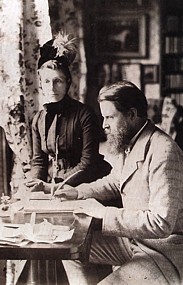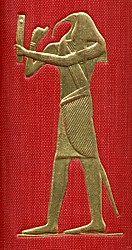|


 We have made a plan…of importing some of the best Anazeh blood to England and breeding it pure there…it would be an interesting and useful thing to do and I should very much like to try it. 
—Lady Anne Blunt; journal entry December 14, 1877. | |
Heirloom is both a bloodstock to be conserved for posterity and a research project on its history. While present day enthusiasts cannot travel to nineteenth-century Desert Arabia or Egypt to examine horses or records, they can study the words and deeds of those who did. Knowledge about authentic Arab "type" and traditional Bedouin breeding practices can now be accessed through numerous published sources. Long-standing enigmas about origins and pedigrees can be investigated. For horses of Heirloom provenance, the books and studbooks of Wilfrid and Lady Anne Blunt are particularly relevant.
The Blunts first traveled in Arabia in 1877. Both kept daily journals and these writings became the basis for Lady Anne's two books, Bedouin Tribes of the Euphrates (1879), and A Pilgrimage to Nejd (1881.) These journals were continued through the years of the Blunts' operation of their seminal studs at Crabbet Park, England, founded in 1878, and at Sheykh Obeyd Garden near Heliopolis, Egypt, established in 1897.  Excerpts from Wilfrid's journals were published as My Diaries (1921), and an extensive collection of Lady Anne's journal entries and other writings appeared in Lady Anne Blunt, Journals and Correspondance 1878-1917 (1986.) Excerpts from Wilfrid's journals were published as My Diaries (1921), and an extensive collection of Lady Anne's journal entries and other writings appeared in Lady Anne Blunt, Journals and Correspondance 1878-1917 (1986.)
In the course of preparing Heirloom Egyptian Arabian Horses, 1840-2000, the Blunt testimonies and nearly 300 other published works were consulted. All these references are included in the book's Bibliography which is reproduced here as an encouragement to students of the Arab horse breed.
BIBLIOGRAPHY

(pdf file)


|
|
|
